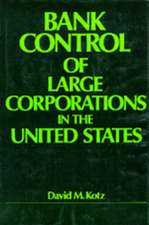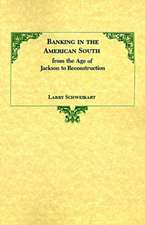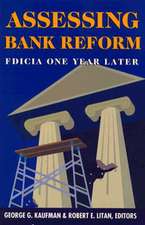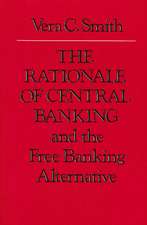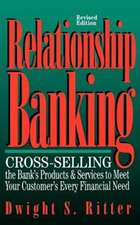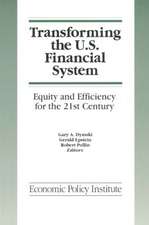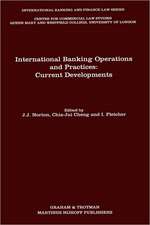The Power Structure of American Business: Emersion: Emergent Village resources for communities of faith
Autor Beth A. Mintz, Michael Schwartzen Limba Engleză Paperback – 30 iun 1987
Mintz and Schwartz offer a fascinating tour of the corporate world. Through an intensive study of interlocking corporate directorates, they show that for the first time in American history the loan making and stock purchasing and selling powers are concentrated in the same hands: the leadership of major financial firms. Their detailed descriptions of corporate case histories include the forced ouster of Howard Hughes from TWA in the late fifties as a result of lenders' pressure; the collapse of Chrysler in the late seventies owing to banks' refusal to provide further capital infusions; and the very different "rescues" of Pan American Airlines and Braniff Airlines by bank intervention in the seventies.
Din seria Emersion: Emergent Village resources for communities of faith
-
 Preț: 144.99 lei
Preț: 144.99 lei -
 Preț: 94.22 lei
Preț: 94.22 lei -
 Preț: 133.99 lei
Preț: 133.99 lei -
 Preț: 146.50 lei
Preț: 146.50 lei - 18%
 Preț: 348.59 lei
Preț: 348.59 lei -
 Preț: 160.63 lei
Preț: 160.63 lei - 12%
 Preț: 290.56 lei
Preț: 290.56 lei -
 Preț: 307.53 lei
Preț: 307.53 lei - 8%
 Preț: 360.28 lei
Preț: 360.28 lei -
 Preț: 208.31 lei
Preț: 208.31 lei - 18%
 Preț: 2261.34 lei
Preț: 2261.34 lei -
 Preț: 302.76 lei
Preț: 302.76 lei -
 Preț: 185.37 lei
Preț: 185.37 lei -
 Preț: 176.35 lei
Preț: 176.35 lei -
 Preț: 156.84 lei
Preț: 156.84 lei -
 Preț: 115.53 lei
Preț: 115.53 lei -
 Preț: 161.27 lei
Preț: 161.27 lei - 8%
 Preț: 311.68 lei
Preț: 311.68 lei -
 Preț: 167.85 lei
Preț: 167.85 lei - 8%
 Preț: 346.31 lei
Preț: 346.31 lei -
 Preț: 209.88 lei
Preț: 209.88 lei -
 Preț: 176.49 lei
Preț: 176.49 lei - 6%
 Preț: 324.95 lei
Preț: 324.95 lei -
 Preț: 101.43 lei
Preț: 101.43 lei -
 Preț: 144.80 lei
Preț: 144.80 lei -
 Preț: 279.55 lei
Preț: 279.55 lei -
 Preț: 163.52 lei
Preț: 163.52 lei - 8%
 Preț: 563.24 lei
Preț: 563.24 lei -
 Preț: 182.98 lei
Preț: 182.98 lei -
 Preț: 215.51 lei
Preț: 215.51 lei - 9%
 Preț: 352.77 lei
Preț: 352.77 lei -
 Preț: 273.93 lei
Preț: 273.93 lei -
 Preț: 115.82 lei
Preț: 115.82 lei -
 Preț: 216.08 lei
Preț: 216.08 lei -
 Preț: 183.89 lei
Preț: 183.89 lei -
 Preț: 106.35 lei
Preț: 106.35 lei -
 Preț: 548.71 lei
Preț: 548.71 lei -
 Preț: 179.04 lei
Preț: 179.04 lei - 9%
 Preț: 352.50 lei
Preț: 352.50 lei -
 Preț: 138.81 lei
Preț: 138.81 lei -
 Preț: 147.26 lei
Preț: 147.26 lei -
 Preț: 128.69 lei
Preț: 128.69 lei -
 Preț: 229.92 lei
Preț: 229.92 lei -
 Preț: 127.89 lei
Preț: 127.89 lei -
 Preț: 138.26 lei
Preț: 138.26 lei -
 Preț: 67.35 lei
Preț: 67.35 lei - 9%
 Preț: 353.24 lei
Preț: 353.24 lei -
 Preț: 126.25 lei
Preț: 126.25 lei -
 Preț: 92.35 lei
Preț: 92.35 lei - 8%
 Preț: 564.99 lei
Preț: 564.99 lei
Preț: 347.24 lei
Nou
Puncte Express: 521
Preț estimativ în valută:
66.45€ • 68.98$ • 55.41£
66.45€ • 68.98$ • 55.41£
Carte tipărită la comandă
Livrare economică 22 martie-05 aprilie
Preluare comenzi: 021 569.72.76
Specificații
ISBN-13: 9780226531090
ISBN-10: 0226531090
Pagini: 348
Dimensiuni: 149 x 229 x 20 mm
Greutate: 0.41 kg
Ediția:1
Editura: University of Chicago Press
Colecția University of Chicago Press
Seria Emersion: Emergent Village resources for communities of faith
ISBN-10: 0226531090
Pagini: 348
Dimensiuni: 149 x 229 x 20 mm
Greutate: 0.41 kg
Ediția:1
Editura: University of Chicago Press
Colecția University of Chicago Press
Seria Emersion: Emergent Village resources for communities of faith
Notă biografică
Beth A. Mintz is associate professor of sociology at the University of Vermont. Michael Schwartz is professor of sociology at the State University of New York at Stony Brook.
Cuprins
Preface
Introduction
1. Constraint, Discretion, and Intercorporate Power
2. Managerial Autonomy, Corporate Unity, and the Role of Financial Institutions
3. The Structure and Functions of Unity among Financial Institutions
4. Bank Intervention, Institutional Stockholding, and Bank Control
5. The Texture of Financial Hegemony
6. Interlocking Directorates
7. The Structure of the Interlock System: The Meaning of Bank Centrality
8. Directional Interlocks and the Integration of Regional Groupings into the National Corporate Network
9. Hubs and Bridges: Unity and the Division of Labor in the Corporate Network
10. Financial Groups and Intracapitalist Competition
11. Conclusion
Appendixes: Data Collection and Analysis for the Mathematical Analysis of Corporate Networks (MACNET)
1. Data Collection: Interlocking Directorates among Major American Corporations, 1962-66
2. Fundamentals of Centrality Analysis for Networks of Interlocking Directorates
3. Refinements in Centrality Analysis
Notes
References
Index
Introduction
1. Constraint, Discretion, and Intercorporate Power
2. Managerial Autonomy, Corporate Unity, and the Role of Financial Institutions
3. The Structure and Functions of Unity among Financial Institutions
4. Bank Intervention, Institutional Stockholding, and Bank Control
5. The Texture of Financial Hegemony
6. Interlocking Directorates
7. The Structure of the Interlock System: The Meaning of Bank Centrality
8. Directional Interlocks and the Integration of Regional Groupings into the National Corporate Network
9. Hubs and Bridges: Unity and the Division of Labor in the Corporate Network
10. Financial Groups and Intracapitalist Competition
11. Conclusion
Appendixes: Data Collection and Analysis for the Mathematical Analysis of Corporate Networks (MACNET)
1. Data Collection: Interlocking Directorates among Major American Corporations, 1962-66
2. Fundamentals of Centrality Analysis for Networks of Interlocking Directorates
3. Refinements in Centrality Analysis
Notes
References
Index



